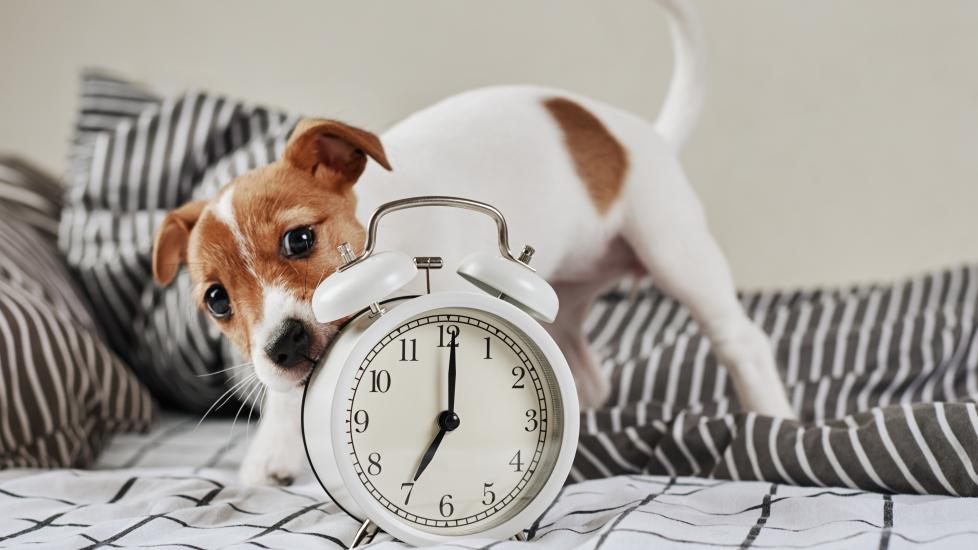Do Dogs Have a Sense of Time?
If your pup has the habit of barking in front of their food bowl or circling you when it’s getting close to their dinner time, you may wonder whether they have a sense of time. The short answer is yes, they do.
However, dogs perceive time differently than we do.
Studies show they may experience it at different speeds. Dogs perceive time through changes in their body, observation, and smell.
Though they may not know “5 p.m.,” or “dinner,” they may know exactly what time it is by the feeling of their empty stomach.
Do Dogs Understand Time Like We Do?
Dogs can understand time as the continuous sequence of events marked by changes in their bodies and in the environment.
Dogs can’t understand time by devices like clocks, but they can perceive morning as a change from dark to light. They can also experience changes in hormone levels, replacing the urge to sleep with stretching and yawning. Morning is also marked by their hunger and their pet parents waking up.
We also know that dogs are capable of emotional and scent memory, and one study has determined that dogs may have episodic memory. This means dogs were able to recall a behavior taught through a mimicry protocol and were able to recall that episode of learning in the future.
How Can Dogs Tell Time?
Defined as the changes experienced over a 24-hour period, an animal’s circadian rhythm is controlled by their biological clock.
Circadian rhythm is key in a dog’s relationship with time. Physiological (functioning of the body) changes in the body tell a dog when it is time to wake up, sleep, eat, go to the bathroom, and exercise.
It’s a known fact that dogs have an impressive sense of smell. In Alexandra Horowitz’s book, "Being A Dog," she discusses a dog’s ability to smell the passage of time by the intensity of the scent.
For example, when you are home, your scent is strongest. After you leave and over the course of your day, your scent begins to weaken. At a certain point, you arrive home. Your dog can use the level of your scent to predict your return home.
Horowitz also points out that the movement of a scent can inform a dog about the past and the future.
A scent that is weak and low to the ground can signify a dog that has passed by. A scent wafting in the air and getting increasingly stronger may tell a dog that someone may arrive soon.
Time to Dogs and Humans
We understand there are many similarities and differences in which humans and dogs experience time.
Dogs have a natural awareness of time, while humans have traded natural awareness for clocks and timers.
Because dogs are so in tune with our activities, pet parents can affect their dog’s sense of time by changing their schedule.
Many dogs can’t sleep until their humans settle. Dogs may wait longer for breakfast on certain days, or have their weekday walk swapped for a car ride to the dog park.
Though most dogs eventually adjust to certain changes, if you have a dog that struggles with anxiety, constant disruptions in schedule and routine can be difficult for them and result in additional problems.
Do Dogs Understand When Time Has Passed?
Yes, dogs can experience time passing.
However, they don’t know how many specific hours, days, or weeks have gone by. The theory of scent distribution and a dog’s ability to remember something based on scent is called olfactory memory.
It’s plausible that a dog can track short amounts of time by the strength of an odor and use olfactory memory for long-term time tracking.
For example, as described above, when you leave for work, dogs will continue to monitor your scent until it reaches a level connected to you coming home.
If you go on vacation for a week, when you and your scent arrive home that will trigger an olfactory, or scent, memory.
Do Dogs Have a Sense of Time FAQs
Do dogs know how long you are away?
They can’t tell how many hours, days, or weeks you have been absent.
But they can sense the passage of time through many mechanisms while you are gone.
Because dogs tend to focus on the current moment, it could be a case of you either being there or not.
Some dogs seem just as excited to see us after a short departure as with a longer departure.
But when studied, more greeting behaviors were observed upon the owner’s return from an absence greater than two hours.
How long does one hour feel to dogs?
Time perception is being looked at more closely.
As mentioned previously, animals perceive time at different speeds—meaning they experience a sequence of events at different rates based on their metabolism.
Dogs have a higher metabolism than humans, and thus experience time more slowly. Our 60 minutes translates to about 75 minutes for them.
Featured Image: Stock.adobe.com/Lazy_Bear
